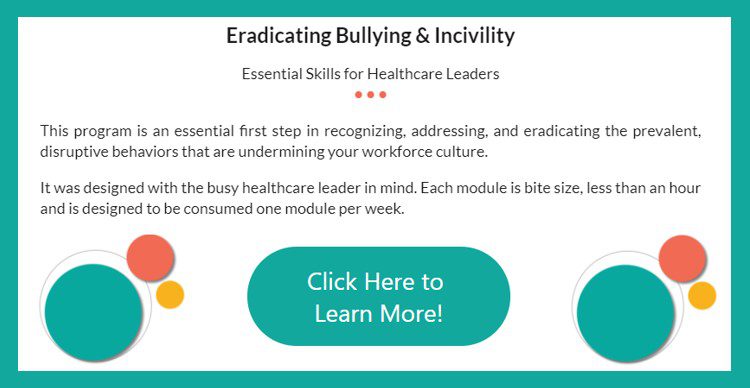 When asked the question, “What is one chronic and painful problem in your industry that no one seems able to solve?”, my response was, “That’s easy. It’s nurses bullying nurses.” But the real question is WHY do nurses bully each other? It seems like a ridiculous notion that nurses can be so kind and caring to patients, but so horrific to each other!
When asked the question, “What is one chronic and painful problem in your industry that no one seems able to solve?”, my response was, “That’s easy. It’s nurses bullying nurses.” But the real question is WHY do nurses bully each other? It seems like a ridiculous notion that nurses can be so kind and caring to patients, but so horrific to each other!
Bullying is pervasive, destructive, and exists in every industry. However, there is a high prevalence of bullying in the nursing profession. Although bullying isn’t rampant in every department, every organization has some degree of bullying. In fact, a whopping 93% of all healthcare employees have either experienced or witnessed bullying behavior. Of the new nurses who quit their first job within the first year, 60% quit because of the bad behavior of their co-workers.
Let’s just say that it’s rare to find a nurse who HASN’T been bullied in some way. I wish I could say that nurse bullying is decreasing but unfortunately, it’s not. Recent research shows that nurses are experiencing greater workplace bullying and incivility now more than ever before (El Ghaziri et al., 2021). Bullying is alive and well in healthcare!
And again, I ask, WHY do nurses bully each other?
Nurses bully each other for 3 main reasons.
Reason #1: We are a female dominated profession and women aren’t always that nice to each other. The gender imbalance in nursing taps into female-to-female competition and aggression. It wasn’t all that long ago that we were competing for the prized male, so women are used to trying to make other women look bad.
Reason #2: Nursing exists in a forced hierarchy. Physicians “rule the roost” – after all, it wasn’t that long ago that nurses had to give up their chairs for the physicians and weren’t respected as a profession. Low status creates a sense of powerlessness and helplessness, leading to low self-esteem. This also leads to reason #3.
Reason #3: Nurses work in a high stress environment. When under stress, we’re not always on our best behavior. Think about the life and death situations in healthcare and the unpredictability of patient care. You never know what you’re going to get when you walk into the door. Things can change dramatically hour by hour! And, we are being asked to do more and more with less and less. The result is a group of highly educated, highly stressed individuals who haven’t established good coping mechanisms to deal with the stress. So, what do they do? They lash out at each other.
How does nurse to nurse bullying typically show up in healthcare practices?
Keep in mind that not everything is “bullying”. Sometimes it is teasing, being rude, or inconsiderate. For a behavior to be considered bullying it has to repeat. A common definition of bullying is, “the repeated patterns of destructive behavior with the conscious or unconscious attempt to do harm.”
Bullying is NOT:
- The manager holding staff accountable for performance, behavior, etc.
Many nurses complain that their boss is bullying them because they were put on corrective action for not following policy, not coming into work on time, calling off too many times, not giving medications, cursing at a co-worker, etc. This is NOT bullying! This is about being held accountable for your nursing practice.
- The instructor holding students accountable for performance, behavior, etc.
Many student nurses reach out to me complaining that their instructor is bullying them because they were given a bad grade or given an “unsafe” during clinical. Again, this is NOT bullying. Perhaps the instructor is just holding his/her students accountable to a higher standard of care. Not everybody should be a nurse!
- Conflict and/or expressing a different opinion
Just because you have conflict or disagree with a co-worker or employee, doesn’t mean either of you are bullies. Conflict is different. Conflict is NOT bullying.
- Having a bad day and getting “testy” with your co-workers.
As stated before, nurses work in stressful environments FILLED with unpredictability and complexity. And-we are not always on our best behavior. I challenge any one of you to claim that you’ve NEVER done or said anything unprofessional at work when under stress. It’s a human thing. However, we are not all bullies!
Bullying IS:
If…There is a target, harmful, and repeated.
- Uneven workloads based on favoritism (charge nurse gives easy assignments to friends-worst assignments to nurses she doesn’t like)
- Deliberate exclusion
- Negative gossip or rumor spreading
- Micromanaging, finding fault, and constant nitpicking
- Silent treatment or ignoring
- Refusing to help
- Yelling or openly criticizing in front of others
- Withholding information to make others look bad
- Sabotage and setting someone up to fail
Why does nurse to nurse bullying take place?
Nurses bully because they can.
First-we accept the behaviors as the norm and fail to recognize bullying behavior. We say things like, “That’s just the way it is in nursing.” Sometimes we say to others, “Well, that’s just how she is. Don’t take it personal.”
Second-when employees are bullied, they don’t speak up. 40% of all targets don’t tell anyone they are being bullied. This silence occurs because of the fear of retaliation. Targets are afraid that if they speak up, the bully will find out and retaliate against them.
Third-leaders use silence as a strategy too. Nobody teaches leaders how to address the bad behavior of their employees yet 85% of a manager’s time is spent dealing with the behaviors of their employees! So, the cycle of nurse to nurse bullying continues.
Why is nurse to nurse bullying a big deal?
- 71% of physicians and nurses have linked incivility to medical errors
- 27% of them said it led to a patient’s death
- 99% of physicians and nurses believe bad behavior leads to poor patient outcomes
- 81% of nurses who leave an organization cite peer and nurse/manager relations as a cause for leaving
When organizations ignore workplace bullying, they have high turnover, added costs, and ultimately, patients have worse outcomes. According to those statistics, one of those outcomes is death! I’d say that’s a pretty big deal.
What can healthcare leaders do to address nurse to nurse bullying?
One of the reasons why bullying can continue for decades without leadership even knowing about it is because of those 40% that don’t even speak up about it! As a leader, the first strategy to addressing nurse to nurse bullying is to start paying attention to your employees by standing back and observing. You’ll be amazed what you see and hear.
Here are some statements to look out for:
- You’ve got to pay your dues.
- It’s always been this way.
- I’m making her a stronger nurse.
- It’s sink or swim here so if you want to survive, you’d better learn how to swim.
- Just ignore him like everyone else does.
Another strategy is for leaders to heighten awareness of behaviors by infusing content related to nurse bullying everywhere. Include content related to conduct in everything ongoing, i.e. staff meetings, leadership meetings, performance reviews, annual competencies, etc. Not just when employees are hired. Every employee should know that they matter AND the way they treat each other matters too.
After all, you can’t expect people to adapt their behavior if they’re not aware their behavior needs to be adapted.
Tackling a problem that’s been swept under the carpet for decades can feel like an overwhelming burden, but it doesn’t have to be that way. If you really want to create and sustain a professional work environment by eliminating nurse to nurse bullying, you need to adopt a top-down, bottom-up, and everything in between approach. Equip yourself with the skills and tools you need to end nurse bullying in your organization once and for all!














1 thought on “Why Do Nurses Bully Each Other?”
The 3main reason of bullying are hard to say out loud and hard to take accountability for. Thank you